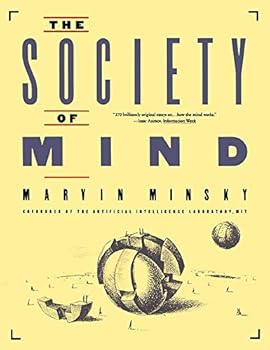The Society of Mind
Select Format
Select Condition 
Book Overview
Marvin Minsky -- one of the fathers of computer science and cofounder of the Artificial Intelligence Laboratory at MIT -- gives a revolutionary answer to the age-old question: "How does the mind... This description may be from another edition of this product.
Format:Paperback
Language:English
ISBN:0671657135
Release Date:March 1988
Publisher:Simon & Schuster
Length:336 Pages
Weight:1.80 lbs.
Dimensions:11.0" x 0.7" x 8.5"
Customer Reviews
6 ratings
Unexpected delight
Published by Stefanie , 3 years ago
A lot better than I expected very thought provoking it's one of those books that requires full attention and study love it
makes you think about the process of thought
Published by Thriftbooks.com User , 18 years ago
The Society of Mind attempts to explain how the mind works. The author considers the mind to be a society of small mental machines that do simple things by themselves but combine to perform amazingly complex tasks like the walking and talking that we take for granted. As this book was written in the 1980's I am sure that it is somewhat out of date. But the questions he asks are timeless. How does memory work? How do we sense space? How do we process conflicting ideas? How do we know when to replace a memory with a more accurate version? This book will make you think about these questions and more. The Society of Mind is worth reading just for the questions it asks.
Amazing
Published by Thriftbooks.com User , 19 years ago
In this book Minsky tries, as have many scientists before him, to explain what seems unexplainable. Even though in present day, many people believe in science over magic, the majority still believes that the brain is somehow magical and cannot be replicated. Minsky asks what stops us from building a brain out of steel instead of carbon? He breaks down the mind in a way that anyone can understand how it works. I'm almost 14 and in the 8th grade. I picked up this book for a research project on Cognitive Psychology because it was the only thing I could find that wasn't written for graduate students. Not only could I understand it, but it kept my attention (unlike most non-fiction books) and I enjoyed reading it. I liked how Minsky could take the most complex thing in the world, the brain, and describe it in easy to understand terms. There were many pictures and diagrams used to represent the text. For example, to show the basics of how the mind works using many separate agents, Minsky used the example of a child building a tower out of blocks and how the agent in the child's mind, called "builder" and all of "builder's" agents beneath it created the tower out of blocks. I recommend this book for anyone curious about what goes on in the mind to cause people's actions as well as anyone interested in artificial intelligence.
Ingenious
Published by Thriftbooks.com User , 23 years ago
I have been reading many books concerened with artificial intelligence and the mind during the past years. Many of them drift off into endless philosophy, or get into too much psychological analysis.Compared to other books out there, this one is easy to read, and is deeply inspiring. Chapters are concise, and comprehendible. I would recommend this book to anybody who is new to AI and overall theories of the mind.
An overlooked gem in the caverns of psychology
Published by Thriftbooks.com User , 25 years ago
Mr. Minsky's book is a true nugget of golden wisdom. A broken-down, step-by-step guide to the elements of thought and action. Tired of self-important terminology and baroque explanation in the realm of psychology? Pick up this brilliant mind's prosaic, simply worded and lucidly illustrated work on the subject of how our minds work. He is the Bob Villa of consciousness.
One of the all-time important books
Published by Thriftbooks.com User , 26 years ago
This book does more to explain the fundamental structure of the human mind than all the volumes of developmental psychology that I've read. In a step-by-step process, Minsky constructs a believable thesis for a way in which the human mind in all its complexity can be built up, layer by layer, from the interactions of "agents", functional subroutines. Some agents are hard-wired by evolution and some are learned. The learned ones stay in consciousness only while they are being built and then become the substrate for higher-level constructs. "The Society of Mind" had shaped the way I look at consciousness.





